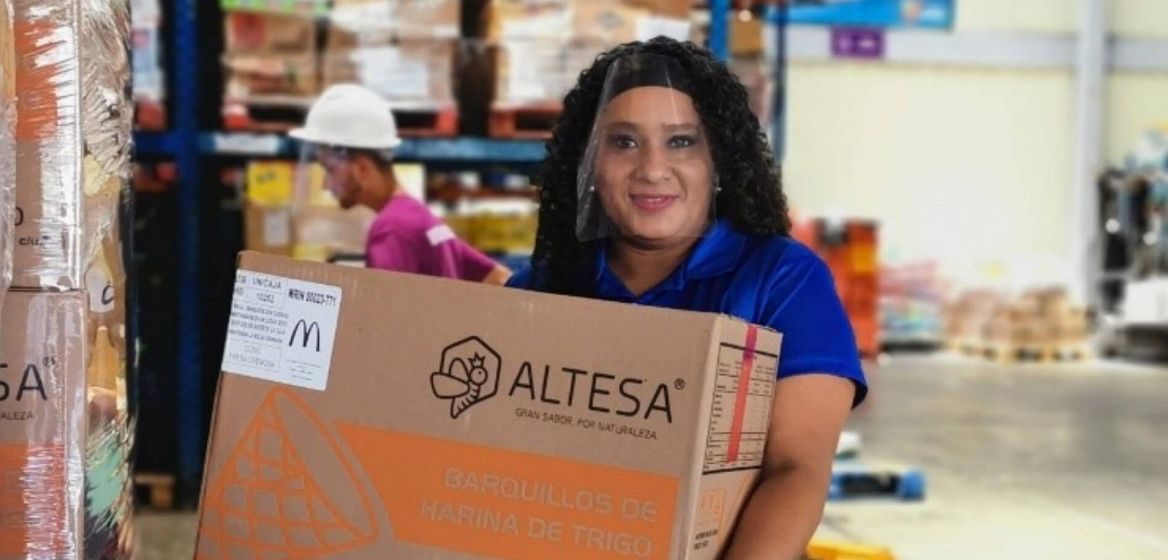How McDonald’s found a way to donate millions of pounds of food that otherwise might have gone to waste
June 25, 2020
Simone G. | Manager, Global Sustainability Strategy | Chicago, Illinois, USA
When COVID-19 struck we found ourselves in a situation we’d never been in before - with quality ingredients that we couldn’t use because people were quarantining at home and not visiting restaurants. And in some cases, restaurants were completely closed due to government restrictions. Simultaneously, due to school closures and rising unemployment, food insecurity was becoming an even greater threat to communities in the U.S. and around the world. This meant that, more than ever, we could not let our food go to waste.
We tapped into the power of our supply chain to expand how we donate food and developed new partnerships with Global FoodBanking Network and Feeding America to make it happen.
What was especially inspiring was how this came to life around the world. As a global corporation, we have over 38,000 restaurants in 120 countries. That means donating food or supplies isn’t straightforward. Our Owner/Operators, suppliers and distribution centers around the world have always given back to their communities and ensured we avoid food waste. But, with the guidance of existing partners like Food Donation Connection and new partners The Global FoodBanking Network (GFN) and Feeding America, we are making sure that millions of pounds of stranded food don’t go to waste. Instead, that food is feeding people who need it in thousands of local communities around the world.
McDonald’s Supply Chain and markets around the world sprang into action to find a new home for surplus food.
We changed our food donation policy so ingredients like meat, lettuce, milk and cheese that could be donated directly to food banks – reaching communities faster and with far larger quantities than ever before.
The COVID-19 pandemic revealed that we could deepen our impact in communities if we leveraged the agility of our supply chain to get more quality food into the hands of NGO partners to feed communities and ensure as little as possible go to waste.
In response, McDonald’s and franchisees around the world linked hands with food banks in their communities to provide food for those most in need.
In the United States, along with support from Food Donation Connection, McDonald’s has donated over nine million pounds- estimated at over $12 million of food to communities and food banks throughout the country since March of this year.
The McDonald’s team in Indonesia donated several pallets of frozen meat and cakes to families through GFN partners Food Cycle in Jakarta and Scholars of Sustenance in Bali. “This was particularly helpful for the Bali community which has been severely impacted due to the population’s dependence on tourism, which has ceased,” said Global FoodBanking Network’s Karen Hanner.
In Costa Rica and markets throughout Latin America operated by Arcos Dorados, McDonald’s donated hundreds of thousands of pounds of meat, eggs, milk and produce to vulnerable communities through local organizations such as Banco de Alimentos Costa Rica, dedicated to reducing hunger.
In Italy, Germany, the U.K. and Ireland, as citizens went into lockdown, McDonald’s partnered with organizations and local food banks to donate surplus ingredients such as eggs, cheese, milk, meat and produce to families in each of these countries. In the U.K. and Ireland alone over 300 tons of food and more than 100,000 liters of milk has been distributed in more than 1,900 town and cities. Since March 2020, McDonald’s has provided 79 tons of surplus product to FareShare, equating to 188,099 meals. In Italy, the European Food Banks Federation was essential to supporting donations throughout the country.
Over the course of the COVID-19 pandemic, McDonald’s Canada has donated over 250,000 pounds of food to food banks and other local charities.
In New Zealand, McDonald’s worked with the Global FoodBanking Network to donate hundreds of food items including eggs, butter, lettuce, onions, apples, tomatoes and cheese. And in Singapore, we worked with Food Bank Singapore to donate milk for migrant workers.
Ultimately, the Coronavirus crisis reinforced that food security will continue to be a pressing issue for people around the world.
At the end of the day, we are a people business – and we are nothing without our local communities, customers, supply partners and franchisees. During the good times and the hard times, we’re going to keep working to make sure our communities are fed. We will always take our mission to help feed our communities seriously.

